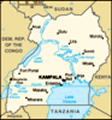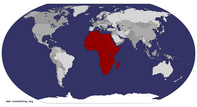Advertisement
Published: June 26th 2018
Disclaimer: These last 2 weeks have been busy so this blog post is long! Read at your own risk..
June 10
th – 23
rd Here’s one thing you may not have known about Africa… it’s really, really cold. Our last week at Ruhija was spent wrapped up in sweaters, jackets, toques and blankets. Since we’re in a tropical forest, it’s pretty damp, which makes the cold seem different. However, we have kept our mind off the cold by keeping very busy. We also had adapted into our life at Ruhija, it was very similar to camping, except more extreme. We became experts at cooking over charcoal stoves, doing laundry by hand, and using latrines. We even became really good at squatting, and I might even miss our squatter latrines when we’re gone (but probably won’t…). We had all 6 Canadian girls sleeping in one room which was smaller than my own room at home. However, we miraculously survived without issues, and even like each other more than when arrived there. Shout out to all my Canadian girls for making Ruhija so amazing.
One of our (many) adventures was trying to make
chapatti one night. We used head lamps for light, a charcoal stove for heat, and kneaded the dough in a bucket we’d just washed with rain water. I was in charge of the charcoal stove, so I had to heat it up (which took about an hour of fanning) and then flipping the chapatti. The chapatti was amazing, but we may have been biased. We even fried some eggs, rolled it in chapatti, and made rolex out of it, which is our new favourite food. There is a rolex stand at the top of our mountain who had lots of business while we’re in Ruhija. Rolex is definitely something I will bring back to Canada.
One Sunday, we went to a church service in a nearby village. We happened to go on a day when a special guest from another church was coming to speak, which meant the service actually ended up being twice as long as it was supposed to. We also could not understand anything that was said because we did not have any of the Ugandan students sitting near us to translate. However, their music and dancing was really good, and it was really
cool to have that experience.
During the week we connected with a women in the community named Tina, who runs the Change a Life Bwindi project. Tina has many different projects going on at once including beekeeping for reformed poaches, tailoring for girls forced into an early marriage, basket weaving for at-risk women, school programs and many more. She even runs her own restaurant on top of that, I don’t know how she does it! On Wednesday, we sat with some of the women in the community and learned how to basket weave. This was a lot of fun, and it really helped us appreciate all the trouble these women go through just to sell 1 basket. It also takes a lot of talent to get the baskets perfect, which we do not have yet.
On Thursday, we went with Tina to a community about a 30 minutes drive from where we are staying. There we met a family of Batwa people. The Batwa people are a group who used to live in the Bwindi forest, however, in the last 50 years the government forced to move from the forests because of conservation reasons
and they had nowhere to go. The particular family we were working with had children, parents, uncle, aunts, grandparents and even great-grandparents all living in a small area of land. While we were there, Tina donated materials so they could build a house to grow mushrooms in. We helped by sorting rice and helped by making a huge lunch for everyone at the site that day. The Canadian students also had the experience of going to fetch water from down in the valley. We went down with all the children, us carrying large jerry cans and them carrying smaller ones. The path down was a bit precarious, sometimes it was super narrow and bordered an incredibly steep drop to the valley below. It was even harder on the way up carrying our jugs full of water up the step incline. I tried to be tough and filled mine up almost full, but then I ended up spilling a whole bunch on me. The children ran in front of us carrying their jugs on their heads and not spilling a drop, it was quite impressive. At the end of the day, they even danced and sang for us, showing us their
traditional culture. It was amazing day, and even though we felt as if we did not really help with the building, we realized how lucky we were to experience their culture and learn about the traditional way of learning.
Our last week in Ruhija, we spent most of the time working on our community projects. Since we are only placed in Ruhija for 3 weeks, it felt as if we were pretty rushed to implement our community project and begin writing our report. We worked with the Ugandan students to start educating the community on maternal preparedness.
We also spent another afternoon basket weaving with the women and manage to finish our baskets. Thursday and Friday morning we went to some local schools to give our Afripads which are reusable sanitary pads. A girls group from an elementary school in Saskatoon raised money and gave it to one of the people in our group so that we were able to buy 80 Afripads to hand out to young girls. Often girls in this area are not educated on menstrual periods, and have to miss school when they experience it because they have no way
to deal with it. We went to 2 different schools and educated the girls on women’s health and menstrual cycles. It was amazing at how receptive they were to the information we were giving them, and they were so excited when we gave out the Afripads to them. This was one of the best parts of our three weeks in Ruhija, it was amazing.
Our last few day, all of us Canadians identified needs within the community and used the money we had fund raised to address them. We were able to split the money into a few separate projects. Our first one was to buy 2 charcoal stoves for the Batwa family who had hosted us for a day. Previously they were only able to cook over a fire, which produces lots of smoke. We were happy that we were able to buy them stoves so that they were not experiencing smoke inhalation.
We also donated a portion of the money to Tina’s project so that she was able to buy another sewing machine. With the sewing machine, she was able to give more women work so that they could provide for their families.
We also donated some to a local school so that the children there were able to write their P7 exams. In Ruhija, there are only primary schools which go up to year 7 (P7). However, to finish primary school they are required to write an exam which costs money, which many cannot afford. This means that the children are often not getting credit for the 7 years of primary school they did simply because they cannot afford the exam. With the money we raised, we were able to pay for all of the children in P7, and paid for all of the girls who were in P6 so that they were able to write the exam the following year, since many girls are forced to drop out of school in P7.
Our last project was to buy a chicken coop for another local school. This school is government funded, which means those who are from the poorer families go to this is school, and many parents can barely afford to feed their children. With the chicken coop that we funded, the school will be able to sell the chickens so they can fund a lunch program for their school.
Living in Ruhija for 3 weeks was one of the coolest experiences I’ve ever had and it has really made me appreciate everything we take for granted in Canada. For example, the first 2 nights we slept without sheets on our bed until we were able to catch a ride to the closest city to buy them. The first night I had sheets again was one of the best sleeps I have ever have, I didn’t realize how much of a difference having sheets makes. We also learned to appreciate accessibility of resources, since Ruhija is so secluded it was hard to get any sort of luxuries. The only thing we could order if we were to go to a restaurant was fries, and many of the fruits had to be transported to Ruhija which made them much more expensive than what we were used to in Mbarara. This means we were often rationing food, toilet paper, hand sanitizer and water. Simple things like having running water to wash our hands, and having electric lighting around the compound were also things that we missed. If you had to go to the bathroom in the night, it was a short hike down a sketchy hill in the pitch black night through the Bwindi forest to the latrine. If we ever needed warm water, it involved lighting a charcoal stove and waiting almost an hour for the water to boil. However, I absolutely loved Ruhija and I’m so lucky to have experienced these past 3 weeks. The people here were amazing and resilient, the children were always so happy to see us, the views were absolutely incredible, and the experience of living in an African Tropical Forest was unlike anything I’ve experience before. I was incredibly sad to leave Ruhija, and I will always remember this time so fondly. I hope I am able to go back some day.
Now we’re headed back and will be working in a hospital for the next 6 weeks. I’m excited to see what this next adventure has in store!
To learn more about the amazing things Tina does in Ruhija and Bwindi: https://www.changealifebwindi.org/
Advertisement
Tot: 0.089s; Tpl: 0.012s; cc: 11; qc: 30; dbt: 0.0492s; 1; m:domysql w:travelblog (10.17.0.13); sld: 1;
; mem: 1.1mb








